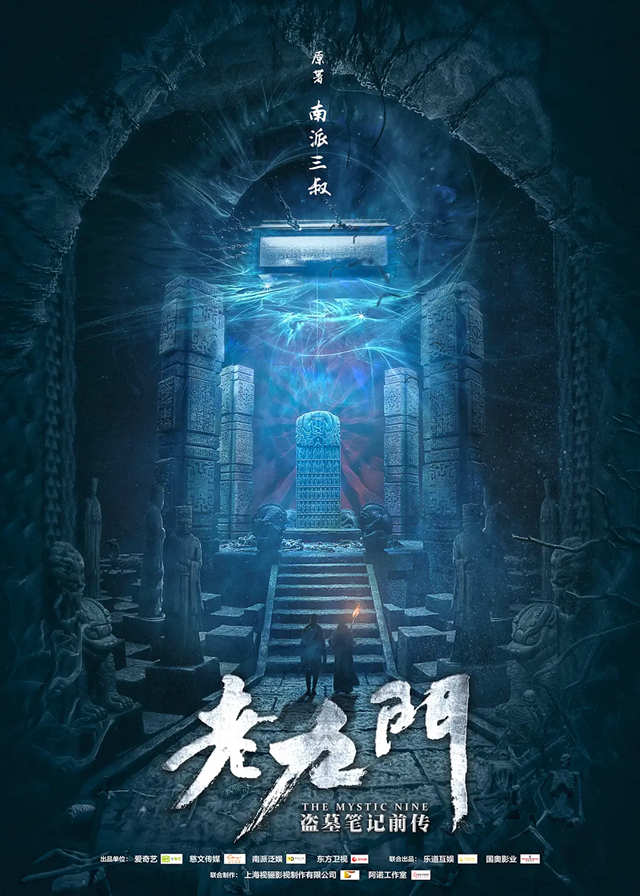The Mystic Nine Episode 48 (Ending) Recap
> The Mystic Nine Recap
Zhang Qishan brought Qi Tiezui to White Qiao Village's sacred tree, revealing its secret. He asked Qi Tiezui if he had ever wondered why the child corpses on the tree never rotted, or why the Japanese specifically took coffins from there to develop viruses. Qi Tiezui realized that Zhang Qishan meant the third Copper Meteorite, recorded in Master Qingwu’s dossiers, was buried beneath the sacred tree. He then understood why the scrolls were written in the ancient Qiao language.
The Chieftain, Shi Huaichan, warned Zhang Qishan against disturbing the sacred tree's foundation. Zhang Qishan explained that the Copper Meteorite had been buried there for thousands of years and had long become one with the tree, making it impossible for him to take. Meanwhile, Jude Kao also discovered that the third Copper Meteorite was buried under the White Qiao sacred tree and came to excavate it.
During his digging, he unearthed a copper piece inscribed with a map and the words "Biaozi Ridge," before disappearing without a trace. While Tanaka had been eliminated by Chen Pi and the Japanese’s schemes thwarted, their invasion did not cease. After years of temporary calm, Japan launched a full-scale offensive across China, and Changsha became an impending battlefield. Zhang Qishan, deeply concerned for his nation and its people, prepared to lead his forces on the front lines.
With a heavy heart, he bid farewell to Xin Yue, intending for her to evacuate to Beiping for safety. However, Xin Yue told him that she had kept people to protect her and that he needed more help on the dangerous battlefield. Zhang Qishan promised to personally retrieve her from Beiping after the war, asking her to send him a telegram once she arrived there.
Later, he instructed his attendant, Kui, to take good care of Madam while he was away. Xin Yue confided in Kui that she was not leaving Changsha, explaining that if Zhang Qishan won the war, she would be there to welcome him home, and if he lost, returning to Beiping alone would hold no meaning.
As war loomed, Er Ye, Sanniang, Ba Ye, and Jiu Ye gathered for a final moment of levity, playing mahjong despite the ominous drone of Japanese planes overhead. Ba Ye, frustrated by his losses and the constant aircraft noise that kept him awake, lamented Changsha becoming an empty city as many people fled. The others teased him for trying to switch seats for luck and for attempting to assert authority in Fo Ye’s absence.
When Zhang Qishan arrived, Ba Ye stopped playing, complaining about not getting travel expenses. Sanniang mentioned the Huo family's imminent departure for the south to escape the conflict. Zhang Qishan asked Jiu Ye his plans, who intended to go to Hong Kong for business. Er Ye revealed he would travel to White Qiao Village. Acknowledging that all banquets must end, Zhang Qishan stated his duty as a soldier was to protect his homeland.
He expressed his hope that when the Nine Families returned after China's victory, they would burn incense at his tomb. He then implored them to remember his wife, Yin Xin Yue, and ensure that no one from the Nine Families would ever offend the Xinyue Hotel, to which they readily agreed. Before heading to the barracks, Zhang Qishan decided to walk through the desolate streets of Changsha.
He was struck by the sight of fleeing citizens, which brought back a flood of memories: his own flight south with his father, his dying father urging him to go to Changsha, and a young Xiangu offering him food before her Auntie called her home for braised pork.
He also recalled his first encounter with Qi Tiezui, who, despite Zhang Qishan's skepticism about fortune-telling, prophesied a future of wealth or power for him, refusing payment and offering the reading as a gift in exchange for future care.
He remembered meeting Er Ye, who warned him about a dangerous ancient tomb, to which Zhang Qishan boldly replied that one must face danger to gain a foothold in Changsha, prompting Er Ye to jokingly ask if he aimed to become the leader of the Nine Families. Zhang Qishan then playfully remarked that Qi Tiezui's fortune-telling hadn't been accurate after all.
He also remembered a joyous occasion of a baby's birth, and a scene in the Pear Garden, all part of the vibrant Changsha he once knew, now ravaged by war. In September 1939, the first battle of Changsha commenced. The Japanese army, fully aware of the battle's importance, deployed six main brigades. While the enemy advanced fiercely, Chinese morale faltered, with some soldiers deserting.
Zhang Fo Ye and his remaining forces were entrusted with the mission to defend Changsha to their last breath, despite being severely outnumbered. The battle raged, and Zhang Qishan urged his men to accelerate their efforts, reminding them that Changsha was their home, its people their kin. He declared that while they might die, their home must not be lost.
He asserted that he was not a great man, but he knew the enemy had invaded their land and slaughtered their compatriots. As soldiers, their hot blood was to be spilled for Changsha's citizens. The city could not fall.
He hoped that one day, their descendants, when honoring their ancestors, would remember the autumn of 1939, when they fought alongside Zhang Qishan on the front lines, giving their last breath and blood to protect their home, proving that "the Chinese won't fall." His soldiers, rallied by his impassioned speech, vowed to defend their home to the death and charged into battle.
As the Japanese forces breached the city, overwhelming Zhang Qishan and his dwindling personal guard, he detonated pre-planted bombs, inflicting heavy casualties. Yet, the enemy’s relentless advance continued with fresh troops pouring in. Just as Zhang Qishan and his few remaining soldiers prepared for a final stand, the other members of the Nine Families—who had not truly left Changsha—appeared, declaring their brotherhood and their refusal to let him die alone. They joined the fierce fight against the Japanese invaders. The legend of the Nine Families continued to be celebrated in Changsha, with future generations remembering the autumn of 1939, when Zhang Qishan led the valiant defense of their homeland.



























